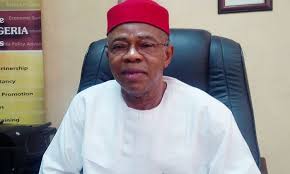This is not the best of times for local manufacturing sector. Just barely escaping the worst recession in decades and managing to pick up the pieces, the sector is now being faced with a market without buyers.
Operators said they were confronted with warehouses stocked with unsold goods while some have gone as far as hawking their products by the roadside.
According to the President of the Manufacturers Association of Nigeria, Dr. Frank Jacobs, the situation is attributable to low purchasing power of consumers.
He spoke through the Director, Economics and Statistics Department, MAN, Segun Osidipe, at a recent breakfast meeting organised by the Nigerian-American Chamber of Commerce themed ‘Nigeria after Recession: 2018 Q1 Review and Economic Outlook’.
Jacobs noted that although the sector did not fare as badly in the first quarter of 2018 as it did in the last quarter of 2017, the improvement in fortunes did not cut across all the sub-sectors.
He said while sectors such as food and beverages, chemical and pharmaceuticals, electrical and cable manufacturing, basic metal, iron and steel, showed improved capacity utilisation, wood and wood products recorded poor performances; pulp, paper publishing and non-metallic products also declined.
He said, “The access to foreign exchange is equally improving but there is a gap. We have a huge inventory of unsold stocks lying in the warehouses of manufacturers.
“If they produce and cannot sell, there is nothing that can be done. The disposable income of the average Nigerian has been eroded. We are trusting that government will continue to work on reducing inflation and making forex available while the policies to ease business dealings in Nigeria are effectively implemented.”
Infrastructure, especially energy was one of the major challenges of the manufacturing sector, he lamented.
Manufacturers, according to the 2016 data from MAN, spent N179bn on sourcing alternative energy.
Jacobs said, based on budgetary provision, it was expected that the allocation for infrastructure would be increased.
“Assuming we had adequate and stable supply of reasonably priced electricity, the manufacturing sector would be able to shift such resources that have been expended on providing alternative energy into increasing production, introducing new products and also being able to generate more employment and income for the government,” he stated.
An economist and lecturer at the Lagos Business School, Dr. Adedoyin Salami, also confirmed that the purchasing power of consumers had weakened tremendously.
He said that wages and salaries as a share of total income had contracted severely and consumers were under intense pressure.
“If you look at the minimum wage, the minimum wage in 2004 was N5,500. The value of that today is N360. The amendment to the minimum wage in 2011 took us to N18,000; that N18,000 is worth less than N2,000 today.”
The Managing Director, Berger Paints, Mr. Peter Folikwe, said that the easiest way to get Nigerian firms productive was to deploy technology, which would make access to raw materials easier and faster.
He said the government needed to pay attention to the Small and Medium Enterprise sector that other nations had used as a launch pad for growth and development.
The Deputy General Manager, and Group Head, Food and Beverages Group, Access Bank, Mr. Nixon Iwedi, however noted that there was a fundamental shift in how Nigeria had been doing business after coming out of recession.
According to him, institutions are partnering the financial sector to change their sources of raw materials.
He said, “Financial institutions are working with the Central Bank of Nigeria to support institutions carrying out backward integration and activities that would ensure that there is forex inflow, such as the Flour Mills Sunti sugar plant, the fertilizer plant and the Dangote refinery.
“Not too long ago, we reversed the trend from being an import-dependent country from cement to being a net exporter of cement.”
The Partner and West Africa Transaction Advisory Leader, Ernst and Young, Femi Alabi, said that in terms of attracting private capital, the biggest challenge firms had was supplying data and financial statement to potential investors.
“You could have a business doing billions of naira but that has not audited its account for the last three years. The other is compliance, from the tax perspective. The business could be doing very well but by the time you do a tax and potential liability analysis, you are coming to N2bn in terms of unpaid taxes going back six years. So, these are the concerns of investors.”
On the outlook for the manufacturing sector, Jacobs said that the operators were hopeful, noting that the fact that some were growing and some still had challenges was a good indication.
He added that with adequate and effective implementation of the policies that government had put in place, the future was bright for the sector.
He however expressed concerns that the government had not put in place a monitoring and evaluation framework that would enable stakeholders to monitor the implementation of some of its policies in a manner that they would positively impact on the manufacturing sector.


